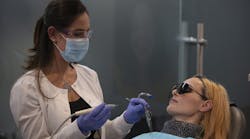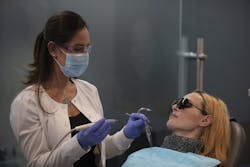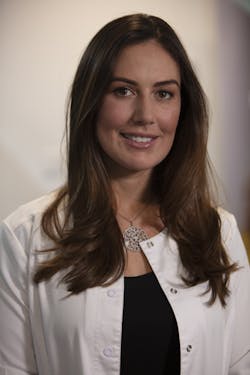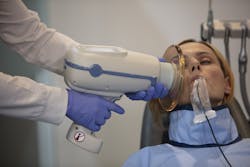Direct access and the dental hygienist
Melissa Turner, BASDH, CPDH, EFDA
The American Dental Hygienists’ Association (ADHA) defines direct access as the ability of a dental hygienist to initiate treatment based on his or her assessment of a patient’s needs without the specific authorization of a dentist, treat the patient without the presence of a dentist, and maintain a provider-patient relationship.1
What comes to mind when you think of “independent dental hygienist”? Is it mobile services, pop-up volunteer events in rural locations, or nonprofit organizations?
Here’s the thing: popular myth may lead you to believe that independent or direct access dental hygienists can provide direct services only in rural settings or indigent communities. The exciting reality is that direct access dental hygienists are making a significant impact in all types of communities—workplaces, residential towers, medical facilities, universities, and even patients’ homes! Just as important to note is that direct hygiene services are not limited to charity events or nonprofit organizations; there are many for-profit companies that have expanded their clinical reach by using direct hygiene services.
Floss Bar provides mobile dental services to employees in workplaces across the country.
Most state practice acts allow dental hygienists to work under general supervision and to provide direct services in the dental office and without the onsite presence of a dentist. But did you know that many states also allow these same hygienists to provide services under general supervision outside of the dental office? Bringing oral care to meet patients where they eat, sleep, work, learn, pray, or play not only increases care opportunities, but allows patients to be treated in comfortable and familiar settings. Also important is that it expands the reach of the dental professional outside of the four walls of traditional dental practices.
Certain state practice acts specify or place limits on practice settings for hygienists; however, states such as California and New Mexico are two examples that do not restrict practice settings at all. Here are some of the most common nontraditional settings across the country in which direct access dental hygienists can provide services:
• Educational facilities such as public and private schools
• Head Start and other child care programs
• State, county, and federal correctional institutions
• Long-term care and assisted living facilities
• Mobile and fixed community clinics
• Federally qualified health centers
• Hospitals
• Primary and specialty care clinics, including outpatient facilities
• Patient homes
• Family violence centers
• Job training centers
• Health fairs and other community events
Focus on New York
Here we turn the spotlight on the state of New York. The New York dental statutes offer two different pathways for dental hygienists to provide direct services: via general supervision, and collaborative practice arrangement. Under general supervision, dental hygienists provide services without the onsite presence of a dentist as long as the dentist is available for consultation, diagnosis, and evaluation.
Under a collaborative practice arrangement, hygienists form a written agreement with a supervising dentist and can provide direct care in hospital settings. As a bonus, New York is one of the few states that includes dentists and dental practices in legislative telemedicine provisions, making it easy for a supervising dentist to instantly connect with a hygienist who is providing services in off-site locations.2,3
Summary of direct access in New York2,3
Direct access provided by two different pathways
• Collaborative practice arrangement
• General supervision
Setting limitations
• Collaborative practice arrangement—hospital settings
• General supervision—dental office, school, or public institution
Patient population limitations—None
Written collaborative agreement needed?
• Collaborative practice arrangement—yes
• General supervision—no
In-person evaluation by a dentist required?—Patients must be referred to a dentist. Under general supervision, a dentist must authorize services and be available for consultation, diagnosis, and evaluation during time of service.
Scope of practice limitations—May provide full scope of services with the exception of administration of local anesthesia and nitrous oxide inhalation analgesia.
Dental hygiene diagnosis defined?—No
Prescriptive authority?—No
Supervision of dental assistants permitted?—No
Direct reimbursement allowable?—No
Minimal clinical hours or additional courses required?
• Collaborative practice arrangement—No
• General supervision—Current CPR certification required
Teledentistry acceptable?—Yes.New York is one of the few states to specifically provide for dentists and dental practices in telemedicine legislation.
Meet Donna Moreschi, RDH
Donna Moreschi, RDH, is the lead dental hygienist and director of clinical quality at Floss Bar, a New York-based dental organization that is a pioneer in the mobile services movement. A 2010 graduate of New York University, Donna began her career as a dental assistant and has been in her current position for more than a year. Though she is responsible for recruiting and training dental hygienists, she also provides direct clinical services. Learn about her successes, goals, and why she thinks it is critical for dental hygienists to provide direct care to patients.
What inspired you to pursue direct access to care?
In 2017, I was working part-time in a dental office and searching for extra hours in the evenings and weekends. Then I stumbled upon Floss Bar. I was excited because the opportunity to work under general supervision and without a dentist physically present was different than my current role in private practice.
At first I treated patients during off hours in dental offices during the evenings or weekends. However, Floss Bar’s current model has expanded into providing mobile services in corporations, workplaces, and residential towers. When working under general supervision in these types of environments, I find it is important to have a detailed emergency protocol in place as well as a dentist who is immediately available for consultation. For continuity of care, I schedule patients directly with my supervising dentist. Floss Bar’s model of bringing services into workplaces has led to fun and relaxed appointments for both patients and me.
What is a typical day like?
I wear many hats, from providing clinical care to supervising the setup and logistics of the day and troubleshooting any equipment or scheduling issues that may arise. Specifically,our hygienists provide care using portable dental equipment. A typical patient who uses our services is a 29-year-old middle-class female who has not seen a dentist in a few years due to balancing her career with health-care needs.
We spend many days behind the desk in a nonclinical capacity. Because Floss Bar is expanding to other states, I spend time learning the ins and outs of the dental rules and regulations in different states. A lot of legal patchwork happens behind the scenes.
Why is it important for dental hygienists to provide direct care to patients?
While there are many dental hygienists and dentists in the country, usable supply for our purposes is low. Patients struggle to access oral health care during the typical 9 to 5 workday. Health-care prices are increasing and becoming unaffordable for many. I believe hygienists are the right people to help create change because most hygienists are open to new ideas, yearn to grow, and are excited to improve the world around them.
What has been the most effective way to build a patient base?
Floss Bar takes care of acquiring patients. Floss Bar’s sales team secures contracts with major organizations and corporations who want to offer in-house dental services to their employees. One of my roles is to then work with the organization’s human resources teams to spread the word and announce our services.
How does reimbursement work?
New York does not allow dental hygienists to own a business or be directly reimbursed, so reimbursement goes to our supervising dentists. Floss Bar charges a fee to the dentist to use our nonclinical services. I then get paid by either the dentist or Floss Bar, depending upon the state in which the services were provided. Our dentists accept most major PPO dental insurances and have fee-for-service options. We do not take public insurance or Medicaid, though it is possible that we will do so in the future.
What tools could you not live without?
I regularly use MouthWatch intraoral cameras to take clinical photos. These are great, simple to use, and have a very high resolution. I’m looking forward to adding Teledent, a MouthWatch teledentistry platform, to the appointment experience in the future. In general, though, I cannot live without my cell phone, laptop, and dental probe. I’ve recently found myself relying on my personal strength and ambition to help me in my journey.
New products and technologies, such as teledentistry and handheld portable x-ray devices, help mobile clinicians save time and space.
What obstacles have you faced in your journey?
Obstacles currently have to do with the regulations regarding direct access hygiene services and how they differ from state to state. In some states, hygienists are required to have direct supervision, so a dentist must be onsite while hygienists provide mobile services. Other states allow hygienists to see only existing patients of record while practicing under general supervision. As a business, we are constantly having to review, evaluate, and make changes to perfect the program. After one year, we now have this down to a science, but I’m always open to new ideas to provide quality services.
What is your ultimate professional goal?
My professional goal is to be a part of the greater dental hygiene movement. I want to help people understand the strong link between oral health and general health, and I want to encourage them to improve their oral health so they can lead healthier lives. I am also passionate about educating hygienists to advance their professional growth.
What community or civic groups have supported you during your journey?
The ADHA has helped me through my entire career as a dental hygienist.
Where do you think you will be in 10 years?
I plan to further my education in business management and then help manage my husband’s health-care business. I would also love to incorporate my clinical skills and run a small business on the side.
What advice would you give to someone who wants to begin a similar journey?
I would tell them to always stay open-minded, positive, and roll with the punches. They also need to be thick skinned to be in management. As hygienists, they need to be sympathetic and caring to their patients’ fears and concerns. They can’t give patients mandates and they can’t shame them. They need to ask their patients why they’re afraid; then they’ll be able to learn more about them in order to earn their trust.
Is there anything you would change about your current position?
No! I’m blessed to have found Floss Bar because working with the team has helped me grow in many ways. Traditionally, dental hygienists do not have many ways to grow or be promoted in a clinical setting. With Floss Bar, I’ve expanded my professional skills into a managerial role, which has helped me have more of an entrepreneurial mindset. This has led me to see things from a different perspective and now my personal goals are much larger than they used to be.
Author’s Note
Feel free to email Donna at [email protected], follow her on Instagram at thehygieneenie, or visit flossbar.com.
References
1. Direct Access States. American Dental Hygienists’ Association website.https://www.adha.org/resources-docs/7513_Direct_Access_to_Care_from_DH.pdf. Revised April 2018. Accessed February 26, 2019.
2. Education Law. Article 133. NYSED website. http://www.op.nysed.gov/prof/dent/article133.htm. Effective January 1, 2015.
3. Variation in dental hygiene scope of practice by state. Oral Health Workforce website. http://www.oralhealthworkforce.org/resources/variation-in-dental-hygiene-scope-of-practice-by-state/. Updated January 2019.
Melissa Turner, BASDH, CPDH, EFDA, practices independent clinical hygiene in Minnesota under a collaborative practice agreement. She runs a nonprofit mobile dental team that provides free care in Minnesota schools, and she is executive moderator for the Dental Peeps Network. Turner is also the founder of I Heart Mobile Dentistry, a Facebook support group for clinicians practicing mobile dentistry. She can be reached at [email protected].
Editor’s Note
Join us as we continue our series highlighting direct access to dental hygiene services across the country. So far, we have learned how communities in Colorado and South Dakota have been impacted by independent and direct access hygienists. Today we turn the spotlight on New York, where dental hygienists are able to provide direct care via two pathways—general supervision and collaborative arrangements.









